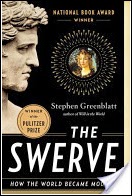Marie Bolchazy, EdD, recommends popular modern fiction and nonfiction with ties to Classics.
The Swerve: How the World Became Modern
by Stephen Greenblatt
A friend of mine recommended the The Swerve
to me—told me he was sure I would want to read it. He was right. It is
indeed a riveting tale about the discovery of Lucretius’s poem, De rerum natura,
which had been lost for more than a thousand years. Poggio Bracciolini,
the greatest book hunter ever, found a copy of the poem in a German
monastery. Its return to circulation changed the course of history.
Indeed, its vision helped shaped the ideas of Galileo, Freud, Darwin,
and Einstein. Thomas Jefferson, when asked about his philosophy, wrote
“I am an Epicurean,” and traces of Lucretius’s vision are evident in
Jefferson’s writing. Consider that Jefferson included the pursuit of
happiness, an Epicurean goal, to be a goal worthy of including in the
Declaration of Independence.
My fascination with The Swerve
began by reading praise for it from such notables as Mary Beard,
Professor of Classics at University of Cambridge. My fascination
increased when I read Greenblatt’s preface. His mother was obsessed and
terrified by the thought of death, and so Lucretius’s meditation on the
fear of death struck a deep chord in him. The preface also brought to my
mind the views of my late husband. When Lou Bolchazy was completing his
doctoral program, his special author was Lucretius, and Lucretius’s
vision influenced him greatly. Lou became an Epicurean. I could almost
hear him talking to me as I read the preface and then again later in the
book when Lucretius’s principles were delineated.
The
book is well researched and well worth reading. While it will appeal to
all educated readers (the friend who recommended it to me has not
studied Latin), it will have a special resonance for classicists.
Marie Bolchazy, EdD
President, Bolchazy-Carducci Publishers


No comments:
Post a Comment